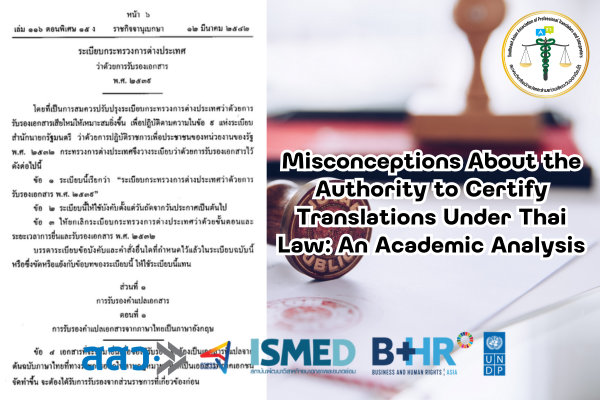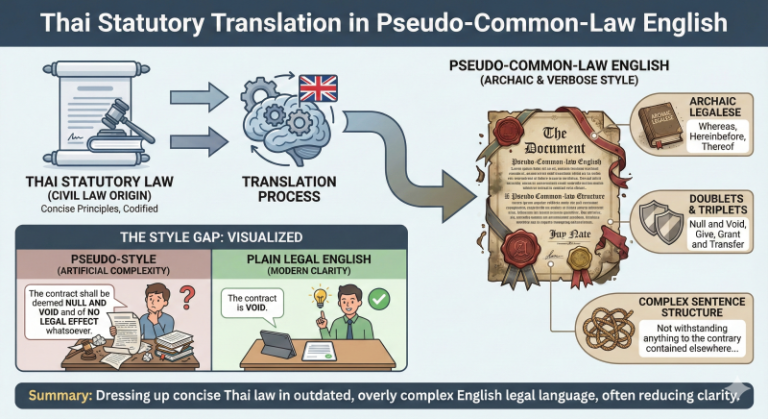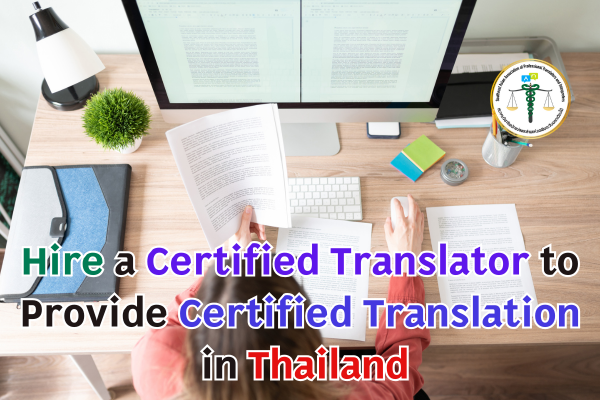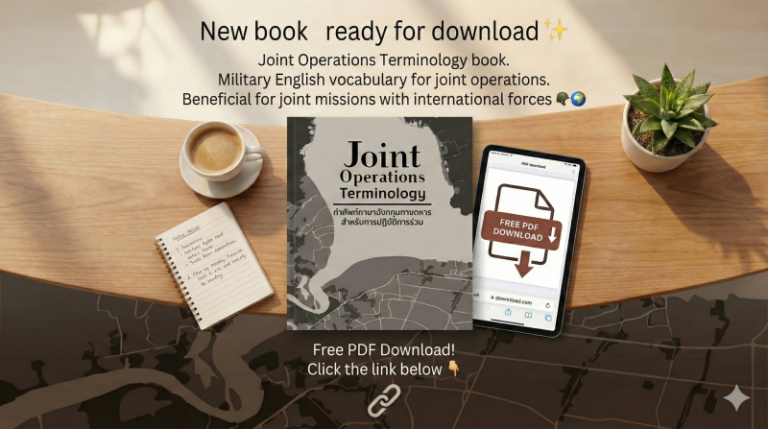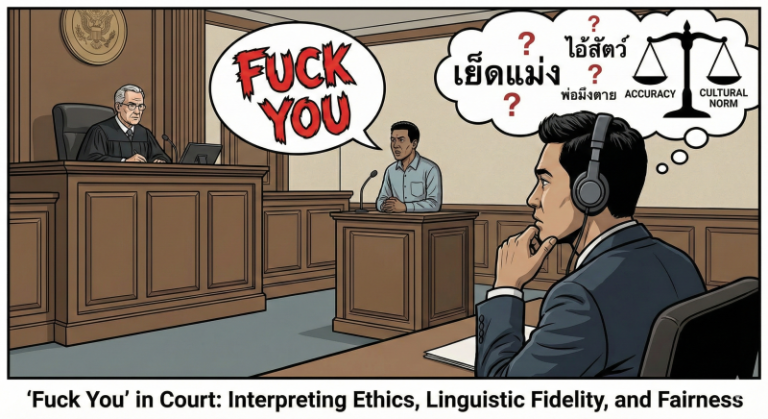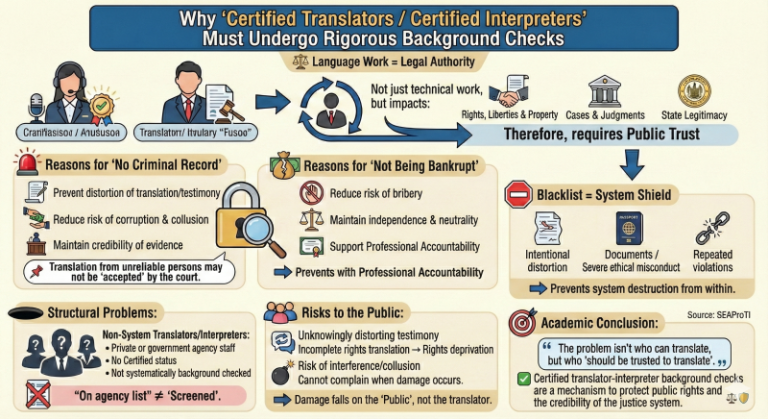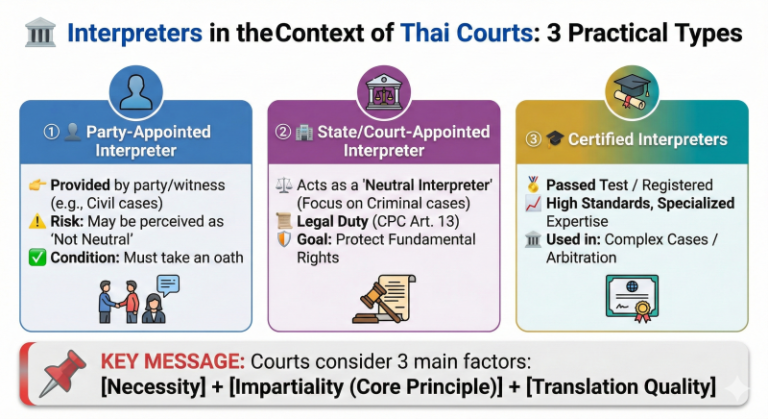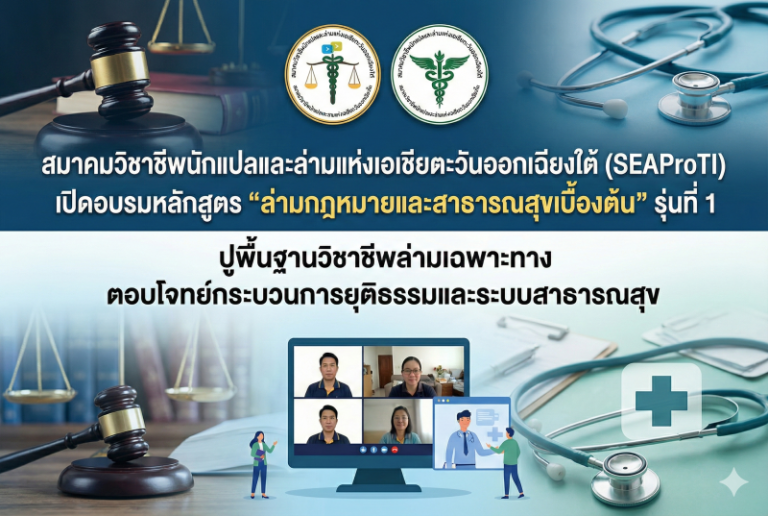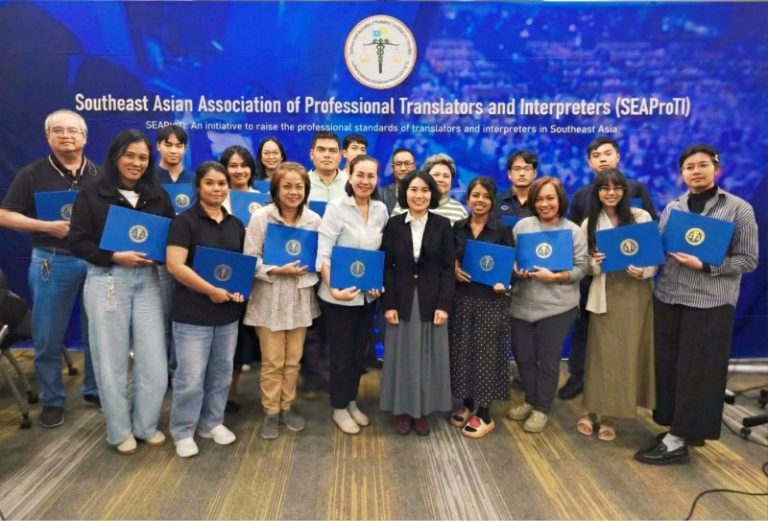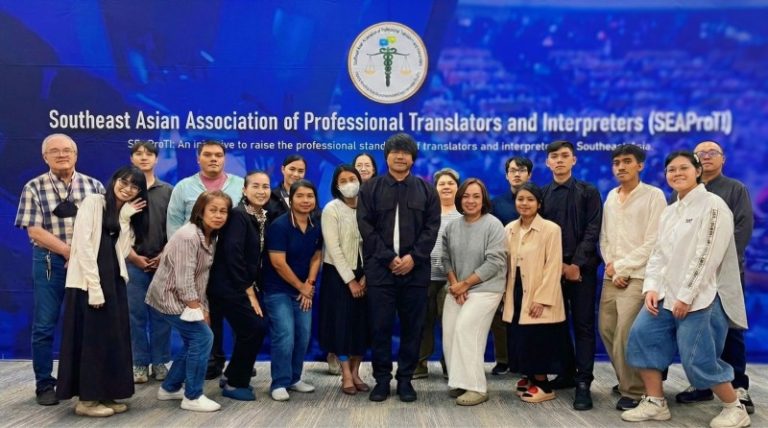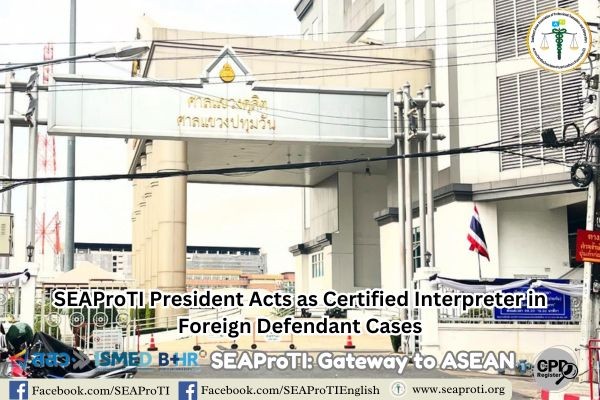Misconceptions About the Authority to Certify Translations Under Thai Law: An Academic Analysis
12 May 2025, Bangkok – Certified translation and legally compliant document translation play critical roles in Thailand’s administrative processes, education, and international business. However, there remains a widespread misunderstanding about the authority and qualifications of certified translators and translation certifiers under Thai law.
This academic article aims to clarify these misconceptions and summarize relevant laws, regulations, and organizational guidelines based on information from the Southeast Asian Association of Professional Translators and Interpreters (SEAProTI).
Legal Developments on Certified Translation in Thailand
1996: Foundational Legislation
The Administrative Procedure Act B.E. 2539 (1996) was enacted as the core legal framework for handling foreign-language documents in official procedures, including document translations for administrative purposes.
1997: Ministerial Regulation
In 1997, a Ministerial Regulation was issued under the Act, specifying the rules, procedures, and qualifications for those authorized to certify the accuracy of translated documents.
2024: SEAProTI’s Additional Regulations
In 2024, SEAProTI introduced Association Regulations on Certified Translators and Interpreters, structured into two main sections:
- Chapter 9: Qualifications for Certified Translators and Translation Certifiers
- Chapter 10: Guidelines on Seals and the Certification of Translation Accuracy
Who Has Legal Authority to Certify Translations in Thailand?
Under Thai law and relevant regulations, the following individuals and entities are authorized to certify translations:
- Thai nationals holding a bachelor’s degree in a curriculum taught in the relevant foreign language
- University lecturers specialized in the relevant language
- Embassies or consulates of countries where the document language is an official language
- Persons authorized under other legal provisions
- Certified translators and translation certifiers accredited by SEAProTI
Common Misconceptions About Translation Certification
1. No Legal Authority
Under Thai law, lawyers have no legal authority to certify translated documents. However, in practice, some lawyers request a qualified person to translate documents, and then the lawyer issues a “certification” of the translation. No provision in Thai law grants lawyers the power to certify translations, except in cases where documents are translated for submission to the Department of Consular Affairs (Ministry of Foreign Affairs of Thailand).
In that specific case, anyone may translate the document, but the translator must certify the translation themselves and be fully responsible for the accuracy and content of the translation.
Additionally, educational institutions have attempted to issue translator licenses or certificates of translator status. However, educational institutions in Thailand have no legal authority to license or certify translators under any circumstances.
2. Why Unauthorized Individuals Translate and Certify Documents
Translation and certification by unauthorized or unqualified individuals often occur due to:
- Lack of qualified certified translators in certain areas or institutions
- Personal gain motives, including altering content to favor legal outcomes
- Mutual benefits between document receivers and unauthorized translators, bypassing certified translators bound by professional ethics and SEAProTI regulations
Conclusion and Recommendations
To avoid legal risks and ensure document accuracy, government agencies and the public are strongly encouraged to use only SEAProTI-accredited certified translators or those who fully meet legal qualifications.
Relying on unauthorized individuals may violate Thai regulations and result in document rejection or negative legal consequences.
For Further Information
For up-to-date guidance, please consult:
- Department of Consular Affairs, Ministry of Foreign Affairs of Thailand (Read More)
- Southeast Asian Association of Professional Translators and Interpreters (SEAProTI) (Read More)
About SEAProTI’s Certified Practitioners:
The Southeast Asian Association of Professional Translators and Interpreters (SEAProTI) has officially announced the criteria and qualifications for individuals to register as “Certified Translators,” “Translation Certification Providers,” and “Certified Interpreters” under the association’s regulations. These guidelines are detailed in Sections 9 and 10 of the Royal Thai Government Gazette, issued by the Secretariat of the Cabinet under the Office of the Prime Minister of the Kingdom of Thailand, dated July 25, 2024, Volume 141, Part 66 Ng, Page 100.
To read the full publication, visit: the Royal Thai Government Gazette
ความเข้าใจผิดเกี่ยวกับอำนาจการรับรองคำแปลตามกฎหมายในประเทศไทย: บทวิเคราะห์เชิงวิชาการ
12 พฤษภาคม 2568, กรุงเทพมหานคร – การรับรองคำแปล และ การแปลเอกสารอย่างถูกต้องตามกฎหมาย เป็นประเด็นที่มีความสำคัญอย่างยิ่งในกระบวนการราชการ การศึกษา และการดำเนินธุรกิจระหว่างประเทศของประเทศไทย อย่างไรก็ตาม ปัจจุบันยังพบความเข้าใจคลาดเคลื่อนเกี่ยวกับอำนาจและคุณสมบัติของ นักแปลรับรอง และ ผู้รับรองการแปล ตามกฎหมายไทย บทความนี้จึงจัดทำขึ้นเพื่อสร้างความเข้าใจที่ถูกต้อง พร้อมสรุปข้อกฎหมาย ระเบียบ และข้อบังคับที่เกี่ยวข้อง โดยอ้างอิงข้อมูลของ สมาคมวิชาชีพนักแปลและล่ามแห่งเอเชียตะวันออกเฉียงใต้ (SEAProTI)
พัฒนาการของกฎหมายเกี่ยวกับการรับรองคำแปลในประเทศไทย
พ.ศ. 2539: การวางรากฐาน
ประเทศไทยได้ประกาศใช้ พระราชบัญญัติวิธีปฏิบัติราชการทางปกครอง พ.ศ. 2539 ซึ่งถือเป็นกฎหมายหลักที่เกี่ยวข้องกับการรับรองเอกสารภาษาต่างประเทศ รวมถึงการแปลเอกสารเพื่อใช้ในการดำเนินการทางราชการ
พ.ศ. 2540: การออกกฎกระทรวง
กฎกระทรวง (พ.ศ. 2540) ซึ่งออกตามความในพระราชบัญญัติฯ ได้กำหนดหลักเกณฑ์ วิธีการ และคุณสมบัติของผู้มีอำนาจรับรองความถูกต้องของคำแปลเอกสาร
พ.ศ. 2567: การเพิ่มข้อบังคับของ SEAProTI
สมาคม SEAProTI ได้ประกาศใช้ ข้อบังคับว่าด้วยนักแปลรับรอง ผู้รับรองการแปล และล่ามรับรอง ครอบคลุม 2 หมวดหลัก ได้แก่:
- หมวดที่ 9: การกำหนดคุณสมบัติของนักแปลรับรองและผู้รับรองการแปล
- หมวดที่ 10: การใช้ตราประทับและการรับรองความถูกต้องของคำแปล
ผู้มีอำนาจรับรองคำแปลตามกฎหมายไทย
ผู้ที่มีสิทธิ์รับรองคำแปลตามกฎหมายและระเบียบ ได้แก่
- ผู้สำเร็จการศึกษาปริญญาตรี ในหลักสูตรที่ใช้ภาษาต่างประเทศตามเอกสารเป็นภาษาการเรียน
- อาจารย์ในสถาบันอุดมศึกษา ที่มีความเชี่ยวชาญภาษาดังกล่าว
- สถานทูตหรือสถานกงสุล ของประเทศที่ใช้ภาษานั้นเป็นภาษาราชการ
- บุคคลที่ได้รับอนุญาตตามกฎหมายอื่น
- นักแปลรับรองและผู้รับรองการแปลของ SEAProTI
ข้อเท็จจริงที่มักถูกเข้าใจผิด
1. ไม่มีอำนาจ
ตามกฎหมายไทย ทนายความไม่มีอำนาจรับรองการแปลเอกสาร แต่ปัจจุบัน ทนายความให้ผู้ที่มีอำนาจในการแปล เป็นผู้แปลเอกสาร แต่ทนายความเป็นผู้รับรองการแปล ซึ่งไม่มีกฎหมายกำหนดว่า ให้ทนายความเป็นผู้รับรองการแปลได้ ยกเว้นในกรณีที่แปลเอกสารเพื่อรับรองกับกรมการกงสุลเท่านั้นที่ให้ใครแปลก็ได้ และผู้แปลจะต้องรับรองการแปลเอง และรับผิดชอบต่อคำแปลของตัวเอง
นอกจากนี้ สถาบันการศึกษา ที่ไม่มีสิทธิออกใบอนุญาตหรือรับรองสถานะนักแปล ก็พยายามจะออกใบอนุญาตหรือรับรองสถานะนักแปล ซึ่งสถาบันการศึกษาไม่มีอำนาจในการออกใบอนุญาตหรือรับรองสถานะนักแปล
2. เหตุผลที่เกิดการกระทำเกินขอบเขตอำนาจ
การแปลเอกสารโดยผู้ไม่มีอำนาจหรือคุณสมบัติตามกฎหมาย อาจเกิดขึ้นจาก:
- การขาดแคลนนักแปลรับรอง ที่มีคุณสมบัติ
- การแสวงหาผลประโยชน์ส่วนตน เช่น การดัดแปลงข้อความเพื่อให้คดีความมีแนวโน้มชนะ
- ผลประโยชน์ร่วมกันระหว่างผู้แปลและหน่วยงาน ที่รับเอกสาร เพื่อหลีกเลี่ยงการใช้บริการนักแปลที่มีจรรยาบรรณและถูกควบคุมโดยข้อบังคับ
บทสรุปและข้อแนะนำ
เพื่อป้องกันความเสี่ยงทางกฎหมายและเพื่อความถูกต้องในการใช้เอกสารแปลในประเทศไทย หน่วยงานราชการ และ บุคคลทั่วไป ควรเลือกใช้บริการ นักแปลรับรองที่ขึ้นทะเบียนกับสมาคม SEAProTI หรือผู้ที่มีคุณสมบัติตรงตามที่กฎหมายกำหนด
การเลือกใช้บุคคลที่ไม่มีอำนาจตามกฎหมายในการแปลเอกสาร ไม่เพียงเป็นการฝ่าฝืนระเบียบ แต่ยังเสี่ยงต่อการถูกปฏิเสธเอกสาร และอาจส่งผลต่อผลคดีหรือการดำเนินธุรกรรมทางราชการ
ข้อมูลเพิ่มเติม
แนะนำให้ตรวจสอบข้อมูลล่าสุดจากแหล่งทางราชการ ได้แก่
- ระเบียบภายในของ กรมการกงสุล กระทรวงการต่างประเทศ (อ่านที่นี่)
- สมาคมวิชาชีพนักแปลและล่ามแห่งเอเชียตะวันออกเฉียงใต้ (SEAProTI) (อ่านที่นี่)
เกี่ยวกับนักแปลรับรอง ผู้รับรองการแปล และล่ามรับรองของสมาคมวิชาชีพนักแปลและล่ามแห่งเอเชียตะวันออกเฉียงใต้
สมาคมวิชาชีพนักแปลและล่ามแห่งเอเชียตะวันออกเฉียงใต้ (SEAProTI) ได้ประกาศหลักเกณฑ์และคุณสมบัติผู้ที่ขึ้นทะเบียนเป็น “นักแปลรับรอง (Certified Translators) และผู้รับรองการแปล (Translation Certification Providers) และล่ามรับรอง (Certified Interpreters)” ของสมาคม หมวดที่ 9 และหมวดที่ 10 ในราชกิจจานุเบกษา ของสำนักเลขาธิการคณะรัฐมนตรี ในสำนักนายกรัฐมนตรี แห่งราชอาณาจักรไทย ลงวันที่ 25 ก.ค. 2567 เล่มที่ 141 ตอนที่ 66 ง หน้า 100 อ่านฉบับเต็มได้ที่: นักแปลรับรอง ผู้รับรองการแปล และล่ามรับรอง


